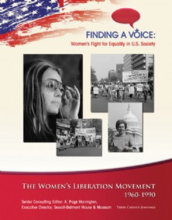Terry Catasús Jennings
Teacher and Parent Resources
Women's Liberation Movement 1960-1990
Below you will find an activity suitable for fourth grade and up. It is composed of a skit moderated by the teacher or parent, and a power point presentation of the historical facts of the women's struggle .
The skit will show students the beliefs held about women in the 19th century--prone to be hysterical and emotionally unstable, incapable of handling money, only able to hold menial jobs, unable to take on important responsibilities, incapable of doing mathematics of any kind, unable to think rationally. Although men lived by these myths, women believed them too. Those beliefs influenced the customs and laws women had to live under--they could not inherit money or property from their fathers; any inheritance was given to the husband or oldest boy child if the husband died; women never had any money of their own; they could not make any decisions for the family. More insidious was the fact that they could not serve in juries. In a situation where a woman was accused, men judged her and they were not prone to be understanding. Women were seldom, if ever able to get out of a bad marriage. Of course, they could not vote.
As time passed, some women were able to take hold of their own destiny, but not many.
When women worked for the rights of African Americans, as abolitionists, they realized they lacked most of the rights that slaves lacked. The women's movement was born. Suffragettes campaigned for the vote. Having won it, though, the culture of male dominance was so pervasive that most women, if they used the vote, followed their husband's lead. And the problem was that there were few women in Congress who could work to change the laws.
Women proved their worth during World War II, but when the men came home, they were asked to step down and return to their subordinate place. The country had to convert war industries to domestic industries so women were enticed into buying and enjoying appliances so that the country could flourish. The strong American family was a counter to the Russian culture. It was patriotic to be a woman. Except it was not fulfilling. In the 1960s women woke up to the fact that they had been able to vote for 40 years, but still had no rights. They still weren't thought of with any more regard than they had been in the 1840s.
This presentation leads students to consider that humans can pigeon-hole not just women but people of other races and cultures--Others--because of our mistaken beliefs in our own superiority.
2014-2015 ALA Amelia Bloomer Project List
ACTIVITIES AND RESOURCES

